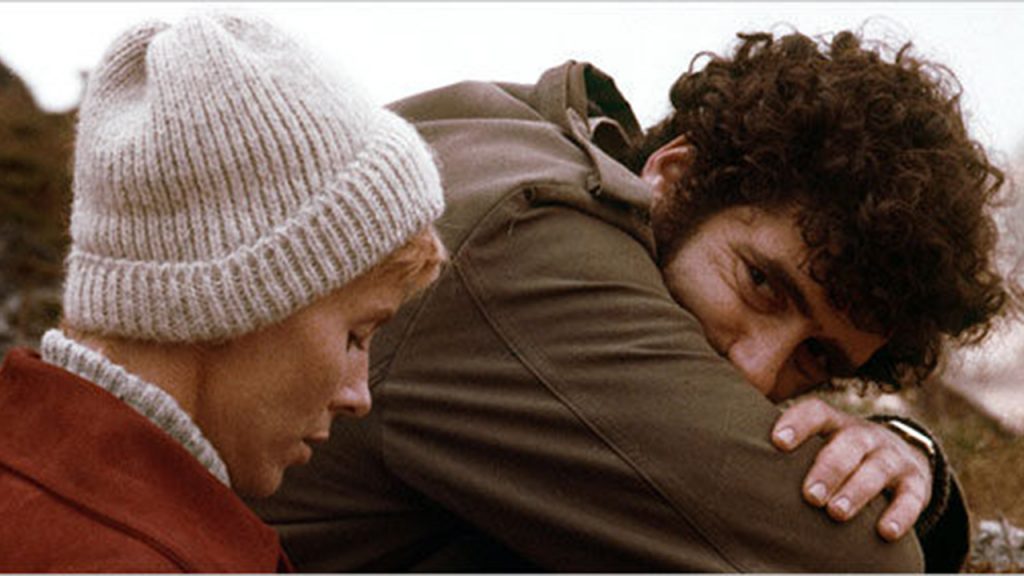Reviewed by Lee Hill
The reissue of the rarely seen 1971 film, The Touch, Ingmar Bergman’s first collaboration with an American studio, is part of a retrospective now playing at the British Film Institute until the end of March. Whether seen separately or with other Bergman films (the BFI is also promoting Persona, The Seventh Seal and The Magic Flute), The Touch, despite its problematic history, confirms the director’s reputation as a compassionate, albeit unsentimental explorer of men and women in intense states of joy, despair, loss, love, hope and grief.
Made after The Passion of Anna and before Cries and Whispers, nominated for a Best Foreign Film Oscar in 1974, The Touch was a result of a production deal offered by ABC Pictures, the now defunct film division run by the American TV broadcaster (their other films included Cabaret, They Shoot Horses Don’t They, The Heartbreak Kid and Bergman fan, Woody Allen’s Take the Money and Run). Unlike other forays by European directors in the English language market of the period – Jacques Demy’s Model Shop and Michelangelo Antonioni’s Zabriskie Point come to mind – The Touch was shot in Bergman’s native Sweden and makes only a few, albeit notable detours from the environment which shaped his art.
As with many of his films, The Touch deals with a small group of characters who struggle for spiritual, sexual and emotional intimacy, but a complex of social convention, personal trauma and psychological barriers either prevent or inhibit the search for this ideal. Elliott Gould plays David, an American archeologist helping to restore a medieval church on the outskirts of Stockholm. Invited by Andreas (Max Von Sydow), a doctor, for dinner, David realises he has met his wife, Karin (Bibi Andersson) before. When alone together for a few minutes, he reminds Karin they met briefly some months before when Karin had just received news that her ailing mother had died suddenly at a hospital. It was when David saw her consumed by sudden loss that he fell in love with her.
As their affair develops, it becomes apparent that the only calm and order in David’s life is his work. Raised by relatives in America, he tells Karin his real parents died in the Holocaust. He has spent the bulk of his life as a brilliant, but peripatetic academic. What little he reveals about his previous relationships sounds dark and troubled. In turn, Karin struggles with her guilt at betraying a happy, if sheltered life with Andreas and her two children, bafflement at David’s mood swings and an inexplicable desire she can barely articulate, but which seems to be answered by David.
David’s cramped apartment where their tryst takes place is where the range of their raw emotions, from bitterness to ecstasy, feels most acute. Away from this battleground, the two are calm and reflective, but also divided. David formulating a plan to woo Karin away from Andreas and start a new life. Karin sensing that they will eventually break up and she will return to a husband and children she still loves. Bergman subtly sets these scenes in or around the church being restored suggesting the latent power religion (and stability at large) has on even the most secular individuals. Similarly it is when David must leave Sweden for several months to complete a teaching commitment and the lovers can only communicate by letter that the affair is at its pure and restorative.
Made a few years before Harold Pinter’s play, Betrayal, arguably became the definitive study of the mysteries of marriage and infidelity, The Touch is also a superficially simple story of a doomed affair, but evolves into something more haunting and enigmatic. As with much of Bergman’s films, the genius is in the details. As David, Gould, the counter-cultural star of M*A*S*H and Getting Straight, brings a mercurial wit to his performance that provides an edgy contrast to the deceptively placid surfaces of Bergman regulars, Andersson and Sydow. Sven Nykvist’s masterful cinematography brings nuance to the autumn light so that sudden bursts of colour, particularly red, underscore the dissonance raging within each character. In the film’s last half hour, Karin visits Sara (Sheila Reid), David’s sister, in London and in a few moments of taut dialogue, the film suggests a whole other way of reading the film.
Bergman shot both English and English/Swedish versions of The Touch and it is the former which undermined the original North American release. For the restoration, the bilingual version takes precedence and its naturalistic flow gives the spare, but dense narrative more sharpness. As is often the case with a neglected work by a great artist, the reissue of The Touch is a potent reminder of why Bergman remains influential. The Touch reminds us that when it comes to the heart and head in conflict, there are no simple answers, but there is, however fleetingly, beauty and grace in the journey.
Director: Ingmar Bergman
Stars: Elliott Gould, Bibi Andersson, Max von Sydow
The Touch can be seen theatrically at the BFI Southbank and select UK cinemas 23-28 February. It will be released on BFI DVD and Blu-ray on 23 April
